137 SEO Ranking Factors for Dentists
While we know that Google uses more than 200 different factors in their complicated ranking algorithm, they have never released a full list, making it difficult for any type of website to efficiently and effectively climb the rankings ladder. SEO for dentists is important because a high search ranking is especially important for dentists who often rely on their websites in order to draw in new patients and educate current ones. Even the best website will only be useful if it can be found by potential patients.
Though this list of ranking factors cannot be called comprehensive, as Google has closely guarded their factors, this list does provide an excellent starting point for any dentist office looking to leverage Google’s own search algorithm in their favor. You are going to see the word “relevant” many times in this list. This is because peppering your site with keywords unrelated to the actual content of your site (but may have great Google rankings), will lower your ranking overall.
Domain Factors
1. Domain Age – While the span of time your domain has been in use may slightly affect your ranking, it is not the most important factor.
2. Keywords in Domain Names – While it is of course important to have your website full of relevant, well-used, dentist-related keywords, it is equally important to ensure that your domain name contains a relevant keyword. Some argue that it should hold the foremost position, while others say that it should simply make an appearance in the domain. Either way, it would be beneficial for your domain name to contain the word “dentist” and your location, along with other oft-search keywords.
3. Sub-Domain Keywords – Another great way to work keywords into your domain name is to use them in your sub-domains. If your website splits into sub-domains, ensure that each of these at least contains (begins with is better) a ranking, dentist-relevant keyword.
4. Keywords in Exact Match Domains – The best way to leverage keywords is with an exact match domain name. These are, for example, if someone searches “dentist new york city,” and your domain name is “dentistnewyorkcity.com.”
5. Length of Domain Registration – According to Google’s own patent: “”Valuable [legitimate] domains are often paid for several years in advance, while doorway [illegitimate] domains rarely are used for more than a year. Therefore, the date when a domain expires in the future can be used as a factor in predicting the legitimacy of a domain.”
6. History of the Domain – Unless you are using a domain that has never been registered (unlikely, especially for keyword-rich domain names) it is likely that another practice owned the domain before it was registered for your office. If websites have been hacked, were used maliciously, or were owned by someone whose other sites were malicious, it may restrict your ability to rank well. Before purchasing and registering a domain, you can check what is called “the whois.” This will show you if the website has any mark against its name.
7. Country Extension – Using a .cn, .eu, or other country extension can help you find a better domain name, especially if other dentists offices have used all the keyword and exact match domains. It may, however limit your search results to a certain geographic area. For example, you would not want to register for a .cn domain if your office is in America.
Page-Level Factors
8. Title Tags – All webpages are required to have a title tag, and Google relies heavily on title tags to establish page rankings. Tags that incorporate keywords will be the most effective for driving traffic to your site. Aside from page content, title tags are one of the best indicators of search phrase relevancy. Ensuring that your title begins with a keyword is essential, as the graph to the right reveals.
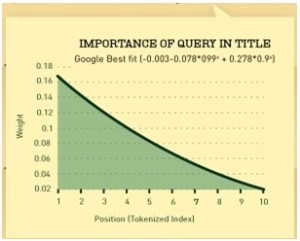
9. Description Tags – These are the short page descriptions that show up under a website’s link in the search results. Keywords here, as well as a short, accurate description of the dentist office, can increase click-through rates.
10. H1 Tags – These tags often work like the title tags, driving relevant traffic to your site through the use of proper keywords.
11. Density of Keywords – Keyword density was once the main focus of all SEO strategies, so much so that pages were often stuffed with awkwardly worded search phrases. While keywords in page content are still vitally important, the density of these keywords is now less important than how well they are incorporated into the content and how relevant and useful that content is for users.
12. LSI Keywords – Keyword density is now less important thanks to Latent Semantic Indexing keyword recognition, which enables Google to see how relevant page content is to a search phrase. This means that “A dentist’s office in New York City,” can rank highly in search results for “nyc dentist office.” Besides being present in page content itself, it should also appear in title, description, and H1 tags where possible.
13. Copy and Paste Content – Before Google began cracking down on this practice, one of the easiest ways to climb the search rankings would be to copy and paste content from a relevant high-ranking site onto your site. For example, if you search for “dentists nyc,” copied the content from the highest-ranking site, and pasted it onto your own site, Google would treat it almost identically as the original site. These days, however, this practice will see you losing footing in the rankings and eventually being pegged as a spam site.
14. Keyword Frequency vs. Other Phrase Frequency – Though keyword density is not as important as it once was, it is important to ensure that keywords outnumber any other commonly-used phrase on your website, or you may see yourself ranking for “dental chair rentals” instead of “dentists nyc.”
15. Length of Content – In general, longer content is preferred in search rankings over shorter content. This may be because it offers more opportunities for keywords to find their way into the content naturally, and that the content overall will be more useful to potential patients. The graph to the right shows that most top rated pages have over 2,000 words of content.
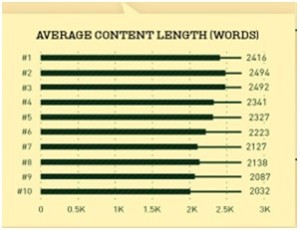
16. Loading Speed – This is probably one of the least recognized page ranking factors. How quickly your page loads can affect your ranking, and it rated by Google’s algorithm, based on the size of your website and the efficiency of its code.
17. Rel-Canonical Tags – Though these tags may be difficult to use correctly, when they are properly implemented, they enable Google to distinguish several similar pages on your website, and only list the most relevant one. For example, if your page contains more than one page that discusses what dental treatments you provide, a rel-canonical tag can ensure that these are not seen as duplicated pages, but rather allow one page to be listed as “canonical.”
18. Update Frequency – While not the most important ranking factor, how frequently and how recently a page has been updated does play a role in rankings. Google even uses the date of the most recent page update beside the description tag in the search results, as pictured to the right.
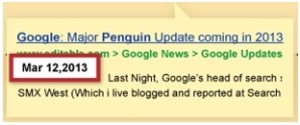
19. Update Extent – How much of a webpage is updated is just as important as how often it is updated. How new the entire page is, and how often the website is and has been “freshened” can affect rankings.
20. Individual Keyword Placement – Using a keyword within the first hundred words of your webpage will increase the likelihood that Google will see your page as relevant.
21. Order of Keyword’s Words – Though LSI has largely alleviated the burden of exact match keywords, some believe that keywords that more directly match the most common search phrases will rank better than those that use a slight variation.
22. Content Quality – Not only should the quality of the content itself be high (meaning that it both provides relevant information and is well written), the grammar and spelling should be carefully watched, as misspellings and egregious grammar errors could signify a low-quality page.
23. Supplementary Content – One of the ways that Google identifies quality pages is by what kind of supplementary content it contains. These are generally interactive features, which for a dentist’s office, may include treatment cost calculators, dentistry-related games, or even interactive education tools.
24. Images – The images themselves, along with how they are tagged in your pages HTML increases both click-through rates and page rankings.
25. Other Heading Tags – Besides H1, keywords should appear in all heading tags.
26. Links – Links that take users away from the page should be quality connections. For example, a dentist’s office could link to information on WebMD about a specific ailment. These kinds of links are not only useful to site visitors, but also help to build an authoritative image for your website. These links should be highly relevant to dentistry, however, as linking to non-relevant pages could actually hurt rankings. In that same vein, too many outside or broken links will also harm rankings.
27. Page Media – Though Google mainly looks at content, including videos, slideshows, and images not only increase the likelihood a patient will contact your office, but also that Google will tag your website as a quality one.
28. Coding – Even if your page looks great on the surface, error-riddled coding will communicate to Google that your site is not quality.
29. Pages Relevancy – All pages should hearken back to the original content. Never include an unrelated page, even if it somehow relates to your interests, or to a side business. This will flag your website as lower-quality and less relevant to search results.
30. Keywords in Individual Page URLs – Each page of your site will have its own individual URL, and each of these should include a keyword.
31. Citing Sources – Just like in school, citing the sources of your information makes your look more authoritative. If quotes or borrowed content is properly sourced, it will not hurt your page ranking as it would if it was a simple a copy-and-paste job.
32. Internal Links – It is important for pages to link to one another, not only making the website easier to navigate, but also pointing Google to the most relevant pages in order to establish rankings.
33. Level of Writing – As the chart to the right reveals, Google does rate their indexed pages by reading level, and these ratings can affect ranking. Intermediate reading level content seems to be the most common, but some argue that basic is better.
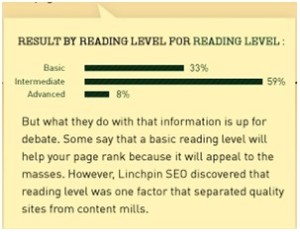
34. Host – Who hosts your dental website matters. A reliable, well-known host can help your rankings, while a novice or slightly shady host can hurt your rankings.
35. Length of Your URL – Elongating a URL just to include several different keywords can actually hurt ratings. Shorter URLs, with dentistry-relevant keywords do better in rankings.
36. WordPress Tags – If using WordPress, effective use of the tagging system can show Google that your page is relevant to a certain category or set of keywords, when those words are included in the tags. In addition, it helps to more closely relate your pages, allowing your page to appear more authoritative.
37. URL String – How pages are categorized and linked together affects how they appear in search results. Proper labels and positioning of individual pages can help them not only be easier to find, but also find higher search rankings.

38. Sitemap – How a specific page is categorized in the sitemap may affect how likely it is to appear in the search results.
39. Quantity of Keywords – The number of different keywords may help a page’s ranking overall, as high ranking for one keyword can help to lift the page for another keyword’s rankings. This is different from keyword density, as several different keywords are implemented, instead of a singular keyword several different times.
40. Layout – Though Google does not have the power to specifically rank pages based on the quality of their design, having a maneuverable webpage, which makes the content easy to find, is more likely to have a better ranking than a site which does not have a navigable design.
41. Lists – Using a numbered list or a set of bullets not only makes content easier to read for viewers, but also helps Google pick out keywords. A bulleted list of dental treatments is a great way to incorporate keywords and make them easy for the algorithm to find.
42. Age of the Page – Though it is vital to regularly update and refresh page content, the page itself should remain intact, as older pages are preferred over newer pages in the rankings.
43. Parked Domains and Masked Forwards – Once used as a way to dominate the search results with several pages that all redirected to the main page, these kinds of domains can now harm search rankings for the legitimate page.
Site-Level Factors
44. Valuable Content – While it may be tempting to write generic content and stuff it with keywords, Google’s algorithm prefers sites that offer real value to readers. If your site provides real information about your office and the kind of treatments you provide, it is more likely to rank higher than webpages that are thin on value.
45. Trust – Websites build their trust factor by linking and being linked by other trusted websites. The more trustworthy your website is, the more likely it is to have a high ranking. This can be done by submitting your webpage to trusted dental-site databases.
46. Site-wide Updates – Refreshing the entire site is just as important as refreshing individual pages. Regular updates, across the entire website will affect rankings.
47. Sitemaps – Making sure that your website has an easy-to-find sitemap not only makes it easier to use, but also makes it easier to index, so that SEO can begin to take hold.
48. Geographic Location of Server – Where the server is that hosts your website is vitally important to your rank. Especially because searches for dentists offices are often very geo-specific, it is important to have a local server.
49. Types of Pages – Along with the educational and information content that will be important to patients, Google looks for “Privacy” and “Terms of Service” pages in order to establish legitimacy. Especially for a healthcare-related field like dentistry, these pages are vital to assuring both your patients and Google that you are a trustworthy entity. “Contact Us” is another page that is very important to building legitimacy, as real contact information shows that you are a real business and not a scammer.
50. “Breadcrumbs” – Also sometimes known as “page navigation,” this allows users to quickly and easily see where they are in your site and navigate where they want to go. It often looks like this:
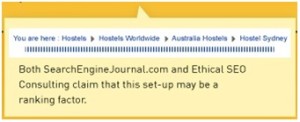
51. Maneuverability – Not only will a difficult to navigate site turn away potential patients, it can also harm your rankings. Time spent on the page matters when it comes to rising through the rankings, and if your website is hard to navigate, if it is difficult to find the information users need and want, it will make your SEO less effective as users quickly click away in favor of a site that is easier to use.
52. Site Structure – A website that is put-together, will easy to find information, great navigation, and valuable content not only makes it easier for Google to index the site, but also to begin picking out relevant keywords.
53. Uptime and Downtime – Though how much downtime your server experiences is nothing you can control, experiencing too much downtime can actually cause Google to delete your site from its index, meaning it will be impossible to find. If your server is down too often, switch to one that guarantees 99.99% uptime.
54. SSL Certificates – Though dental websites rarely actually sell anything online, you may allow your patients to schedule appointments online. This means that their information and yours will be exchanged online, so an up-to-date SSL Certificate is necessary, and signifies to Google that your site is trustworthy, which improves rankings.
55. Optimization for Mobile Devices – With the proliferation of internet-enable mobile devices, it is more important than ever that your website be just as navigable on mobile as it is on the desktop. Not only does Google prefer websites that are have mobile optimization, it also increases page views and time spent on the page.
56. YouTube – The fact of the matter is that Google owns YouTube, so they like to see YouTube videos being used on webpages. Simple videos about your office, the dentists, your hygienists, or dental hygiene can boost your rankings and increase the time people spend on your site.
57. Rely on Google Analytics and Webmaster Tools – Not only do these two programs make it easier for Google to thoroughly index your page, they also give Google access to far more data than webpages that do not have them installed. More data means better rankings in a shorter amount of time.
58. Reviews – If you allow patients to leave reviews, or if your office is listed on Yelp.com, the better those reviews are, the better your rankings will be.
Backlink Factors
59. The Age of Domains – How old the domains are that link back to your website matters. The older they are, the better.
60. How Many Pages Backlink – How many pages actually link back to your page is taken in to consideration by Google’s algorithm.
61. Quality of Backlinking Pages – The page ranking of pages of that link back to yours can affect the quality of those backlinks.
62. Picture Alt Text – Like all tags on your website, use the alt text as an opportunity to put in some extra keywords. Besides just simply tagging a picture of your office, “office,” use something like, “Our New York City Dental Office.”
63. Social Shares – How many times your page is shared over social media can affect your ranking on Google. Setting up and actively using a social profile for your office that promotes your link is a great way to increase your number of shares.
64. Guest Posts – While most bloggers will post their blog and backlink themselves, some employ the guest-blogger method, which is not as effective when it comes to improving rankings. If you are going to ask bloggers to write about your dental office, ask that the blog author himself posts the content.
65. Nofollow Links – As Google has said, they “don’t follow them,” when it comes to nofollow links. Some believe that this actually means that they do follow them, they just do not allow them to affect rankings.
66. Number of Linking Domains – As the graph to the right demonstrates, the number of domains that link to your website is one of the most important factors when it comes to Google page rankings.

67. Top Level Domain Links – Though most people believe that being linked on a top level domain (like .gov) is more valuable, these links rate the same as any other in the hierarchy of backlinking. However, links from geo-specific top level domains in your same geographic area will be more valuable than those outside of your area.
68. Competitor Links – If a page that is competing with yours in a certain keyword links to your webpage, this can greatly boost your rankings in that keyword. You can achieve this by cooperating with other local dental offices if you offer services that they cannot or vice versa.
69. Bad Neighborhood Links – The internet has bad neighborhoods, like any industry. Links from these websites can hurt your rankings.
70. Where Backlinks Link – Links to your homepage will be more valuable than links to other pages within your site.
71. Link Portfolio – Google considers a diversified link portfolio (links on many different sources), much better than having lots of links on just forums or just in blog comments.
72. Sponsorship – Even if you have paid to have your link included somewhere, the words “sponsored” or “partnership” near your link can devalue that link.
73. Redirection – If your links redirect excessively (or in some cases, at all), those links will also be devalued. This signifies that you have misrepresented your webpage.
74. Anchor Text – If the link uses anchor text, make sure that anchor text is relevant and perhaps even contains one of your keywords.
75. Link Titles – When you hover over certain links, the text that appears is called the link title. This is another great place to insert a keyword and to ensure that Google sees your link as relevant.
76. Link Locations – A position in the first portion of the text makes a link more valuable than a link slapped at the end of your text.
77. Content of Linking Site – For dental websites like yours, a link on a dental-related site will be much more valuable and provide much better rankings than one on an unrelated site. In that same vein, the content around your link, whether it is positive or negative, matters greatly. Google will read this text, and negative comments will devalue that link and your website. The text in general should relate directly to your website, should be well-written, and should be of a significant length. Longer than 500 words is best.
78. Links on Resource Pages – A link on a website known for providing reliable information is one of the most valuable backlinks you can place. Any website known for its authority on a subject will see extra attention from Google. If there are well-known webpages that recommend local businesses, this would a great place for a link.
79. Links in the Content – Links that are included in the actual body of the webpage are considered more valuable than links in blog comments or stuck in a forum post. This is especially true of links whose anchor text flows naturally with the rest of the content, as pictured to the right.
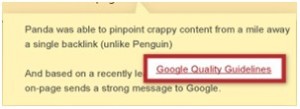
80. Link Velocity – The number of times your link generates a click is indicative of link popularity. When this velocity is positive, the link helps your ratings. When it is negative, it can actually hurt your ratings.
81. Wikipedia Source – If your website can be linked to as a Wikipedia source, it may increase the visibility of your site, while adding to your site’s trust factor. Though these links themselves are not considered by Google, they can still be helpful. Conducting a study of your patients or contributing a tidbit of information to a dentist-related Wikipedia page is one way to create this kind of link.
82. Age of the Links – The age of the link itself can influence rankings. Older, popular links are better than new links.
83. Natural Links – The more links you have in several different venues the better. Not only will this make you more resilient to Google’s algorithm updates, you also have better visibility, and Google sees your links in total as more trustworthy.
84. User Links vs. Owner Links – Google can tell the difference between websites and links posted by the website’s owner, and ones posted by genuine users. Genuine user links are far more valuable.
85. Number of Other Backlinks – Links on websites that exist simply to backlink to other website can lower your page ranking, even if those links are surrounded with relevant content.
86. How Real the Backlink’s Site Is – Google can tell the difference between real blogs and websites, and those set up simply to manufacture content. What kind of users view the site and how often they interact with the content show Google which websites can be trusted and which cannot.
87. Link Exchanging – Though there is no sign that exchanging links devalues them, Google warns against this kind of backlinking.
88. DMOZ Links – Getting listed on DMOZ and having back links on DMOZ sites are a great way to build both an internet presence and valuable links.
89. Yahoo! Listed – Google also gives extra weight to links in the Yahoo! Directory.
90. Forum Profiles – Because it is easy to create thousands of forum profiles and stick a link into each one, Google has begun to disregard these kinds of links. Even profile links for real dentistry-related forums are often disregarded.
User Interaction
91. Click-Through Rate – The more times your page is clicked on in the search results, the better your ranking in the search results will be. How organic that click-through rate is will also affect rankings.
92. Length of Stay – Especially for a dentist’s website, users should stay for quite some time. If users click in to your page and then immediately click away, this signals Google that your page may not be relevant to the keywords it implements.
93. If Visitors Return – How many times a certain user returns to your webpage, and how many users are repeat visitors can improve your rank. Especially for dentist offices, users should return often, either to read updates, find contact information, or schedule and appointment.
94. Bookmarking – If site visitors bookmark your website, it may help your rankings. Again, patients are likely to bookmark a dentist’s webpage so they can easily find it again.
95. Comments – Comments on a webpage signify quality to the search algorithm. This may not always be viable for a dentist’s page, but if your site includes a blog, ensure that comments are enabled and encourage readers to leave a comment.
96. Traffic Volume – How much traffic your website gets affects its overall ranking. More traffic means a better ranking.
97. Blocked – If your webpage is blocked by filtering add-ons, this is very bad for search engines. This should not be a problem for a dentist’s office site.
98. Google Toolbar – The information that this program gleans from your website supposedly helps improve ranking, though the only known information it communicates to Google is how quickly your page loads.
Special Algorithms Rules
99. Newness – In general, older pages with fresher content are favored, however, for some keywords, newer pages are preferred. This generally refers to news outlets, and will probably not affect your website.
100. Diversity – Very ambiguous keywords will get diverse search results, so specificity is better. For example, instead of focusing just on “dentist,” focus on “dentists in [your location].”
101. History – The more a specific user searches for a particular keyword and clicks on your website, the more likely your website is to be higher in their search results later on. Patients who often search for your site are more likely to find it higher in their results next time they search for it.
102. Safe Search – Ensuring that your site is free from any explicit content will keep it from being filtered by safe search.
103. Geo–Specific – Patients with IPs in your area are more likely to find your business than users with IPs not in your area. Ensuring that your website is rooted in the “local” web will ensure that it appears above other, non-local search results.
104. DMCA – If another webpage files a DMCA (copyright) complaint against your website, it will be down-rated. This can be avoided by using original content.
105. Brands – Big-name brands are often given preferential treatment over other search results. This may turn into a problem for your ratings if there is a large chain of dentist offices owned by the same group in your area.
106. Office-Specific Searches – If a patient searches specifically for your office, it may bring up several of your website’s pages as individual results before it moves on to related results.
107. The News Box – Some keywords cause Google to use the “News Box” search results, which shows preferential treatment to news stories. This may happen if there has been a noteworthy news story about dentists in your area.

108. Image Results – If your keywords are often used to search in Google images (this is unlikely), Google web results may be edged out by image results.
Social Signals
109. Tweets – The number of times your office is tweeted about, and the number of tweets you yourself produce may affect rank.
110. Facebook – A Facebook account for your dentist office is a great way to build a presence in the community. The number of likes your office has a very small bearing on its overall rank. The more popular it is, the better your rank. When your page is shared of Facebook, this too can affect rank.
111. Sharing Sites – Websites like Digg and Reddit may have some bearing on search results, though these are probably unlikely venues for dentist office links.
112. Pinterest – Though Google does take into account Pinterest Pins, it is not as influential as Facebook or Twitter.
113. Google + – Because this is Google’s own social network, Google does put some emphasis on the number of circles and +1’s a site has. Building a working Google + account for your brick and mortar office can ensure that you make the most of these numbers. Having a verified account is especially useful, as Eric Schmidt, the current CEO of Google has recently said:
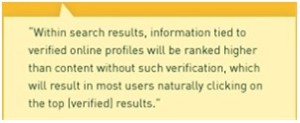
114. Relevance – Just like with backlinks, Google carefully considers the content surround the share or link, to see if it is relevant to your page.
115. Authority – Presence on social media helps to build the trustworthiness of your website.
Brand Signals
116. Anchor Text – Including the name of your practice in any anchor text is a great way to build a brand signal.
117. Searches for Your Office – The more times someone searches specifically for your office, the better your office (brand) will look to Google.
118. Social Media Presence – A social media presence not only helps to build personal relationships with your patients, but also shows Google that yours is a legitimate site.
119. LinkedIn – Having a LinkedIn profile both for your brand and for each dentist, hygienist, manager, and secretary that works in your office is a great way to boost visibility and legitimacy.
120. Non-Links – While backlinks are preferred, Google also looks for areas where your office is mentioned without providing a link to your webpage.
121. Taxes – In the case of dentists’ offices and other businesses, Google may actually investigate whether your company pays taxes in order to define your legitimacy.
WebSpam Factors
122. Panda – Panda rates webpage content by quality. Low quality content gets a penalty (lower in the search results).
123. Pop–Ups and Other Annoying Ads – While advertising on your office site may bring in a little extra revenue, unrelated and annoying advertising can downgrade your website. Advertisements on the top half of your webpage are especially negative.
124. Too Much Optimization – When it comes to keywords, there is too much of a good thing. Too many keywords, written into the content too often can penalize your site. This can go for individual pages and for the site as a whole. Even keyword stuffing meta–tags is considered bad form.
125. Affiliates – If you advertise with affiliates, don’t overdo it. Google pays extra attention to affiliates and penalizes any page that relies too heavily on them.
126. Content Written by Computers – The algorithm can generally tell if your content has been written by a computer and gives preference to content written by humans.
127. Gaming the System – Google also penalizes pages that try too hard to boost their own ratings.
128. Server Penalties – If the server that hosts your site is flagged, all of its sites, including yours can be flagged as well.
Backlink Webspam Factors
129. Too Many Links – Enacting too many backlinks at once signals Google that they are inorganic.
130. Backlink Site with Penguin Penalties – If your backlinking venues have been pegged by penguin, it can affect your rating as well.
131. Low Quality Links – If most of your links are in forum profiles or blog comments, all of your backlinks may be downgraded, along with your website.
132. Irrelevant Domains – If you do place backlinks, they should be on sites that have at least a little to do with dentistry. According to the graph at the right, websites that are linked on unrelated websites are more often penalized by Penguin.
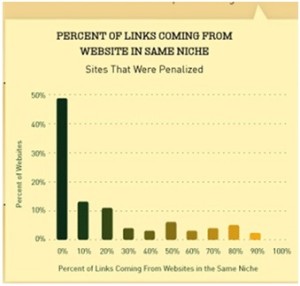
133. Heed the Warnings – If Google detects that too many of your backlinks are faulty, it will usually alert you before decreasing you rank.
134. Same Server Backlinking – Even if this is unintentional, too much backlinking on domains that share your same host can cause all the links to be flagged.
135. Bad Anchor Text – Because your anchor text should directly relate to dentistry, it is unlikely that it will be flagged for having “pharmaceutical” keywords. To avoid this kind of devaluation, ensure that the surround content is good.
136. Manual Downgrades – Sometimes, Google will manually decrease a page’s rating.
137. Lifting Penalties – This can be done either with a Disavow Tool or a reconsideration request submitted through the proper channels.
Other Helpful Sites About Ranking Factors:
http://moz.com/search-ranking-factors
http://moz.com/blog/ranking-factors-2013
http://searchengineland.com/seotable
http://www.searchmetrics.com/en/services/ranking-factors-2013/
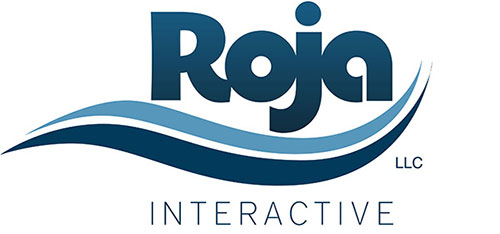
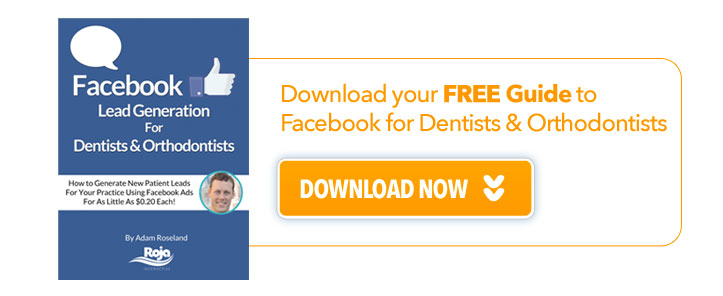




Leave a Reply